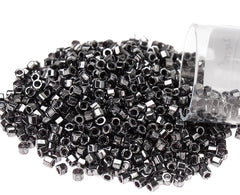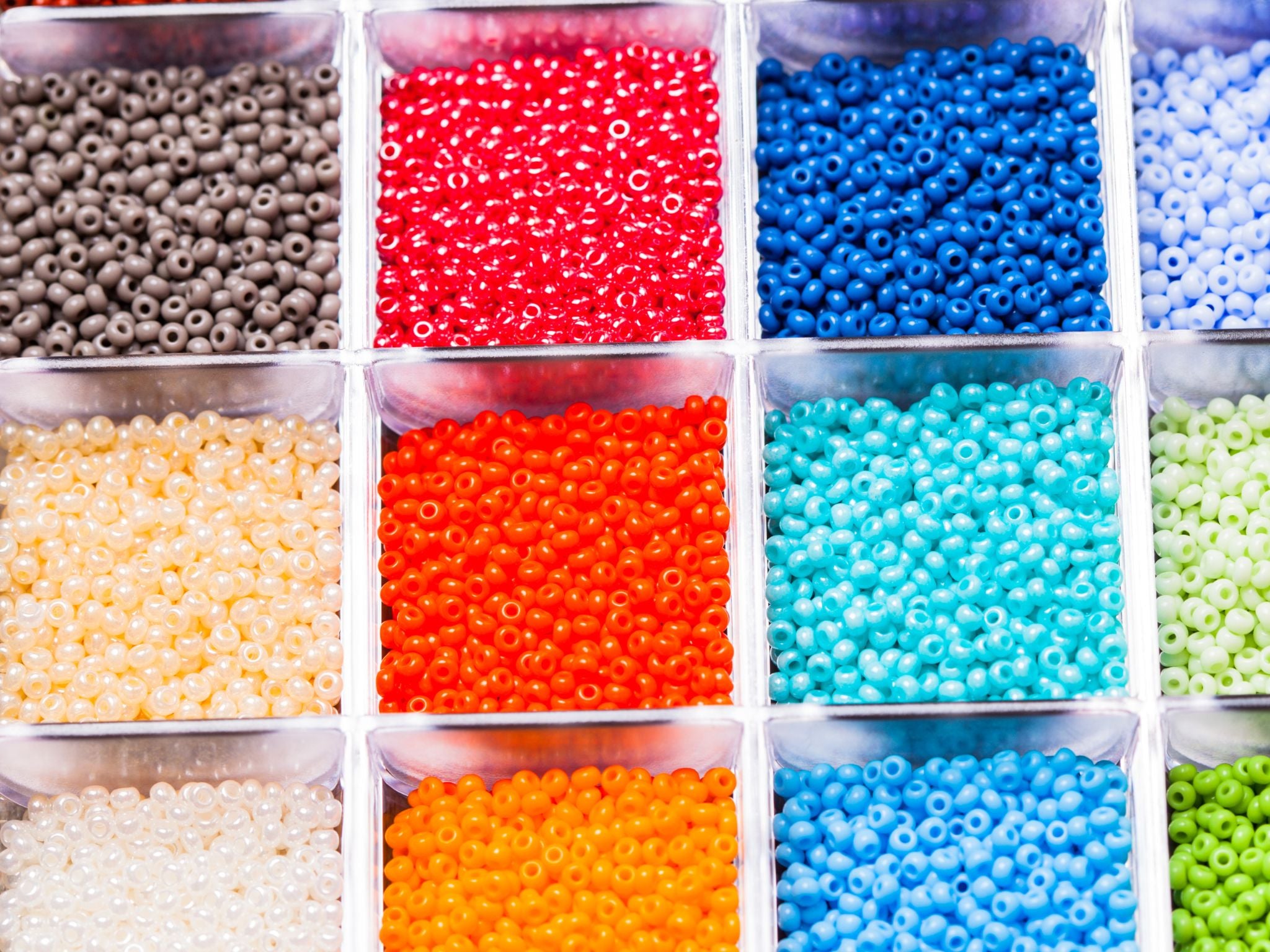You may have heard of some of these and others might be causing you to scratch your head. These are all different types of seed beads. If you are new to beading or even if you have been at it a while it can be overwhelming.
How do you know what beads to choose? Well first you have to know what they are and their characteristics. Then you can start to get an idea of what you need for what you want to do.
| Rocailles - In the crafting and beading community rocaille is often used interchangeably with round seed beads - any small, uniformly shaped bead. Depending on the supplier they may reserve this term for a more specific type of bead within their product line that usually has a donut shape to it. The thing to know here is that it is a rounded bead and can be used whenever a project or pattern calls for a seed bead. They come in many sizes from less than 1mm to several millimeters wide. Usually they will be made of glass and come in a wide variety of colors and finishes. Sometimes you will find plastic seed beads as well. |
Round beads give a finished piece a more natural organic feel and are suitable for many projects. Depending on the brand and quality you will see different amounts of uniformity. In the bead world you get what you pay for. Cheaper beads are less likely to be uniform and you may have to spend some time sorting or “culling as it’s commonly referred to before beginning a project. Toho and Miyuki are the most well known brands for quality seed beads. They are both Japanese companies.
That’s not to say that these less uniform beads don’t have a place in the bead world. They can be great for projects that don’t require a uniform bead. Some of these would include strung necklaces and bracelets, bead embroidery, those skinny beads can come in handy, or a beadweaving stick that doesn’t stack the beads up next to each other like spiral stitch.
Round seed beads come in a multitude of brands like Dyno-mites, Preciosa seed beads, Miyuki, and Toho to name a few. They also come from various countries: Japan, Czech Republic, India, Africa, China and more.

|
Takumi LH Beads - These beads are from the TOHO brand and feature holes that are 15% larger than your average seed bead. Perfect for those projects that require many passes. They are round seed beads and have thinner walls making them lighter. These beads are great for projects where you might want to use thicker thread like Kumihimo, Macrame and Crochet. |
|
Demi-Round - A new shape from the TOHO brand. Demi Round is a thinner version of the traditional round seed bead. Because The Demi Round has the same hole size and diameter as Round beads, it can be combined well with other beads and beading methods. Honesty until I started doing research for this post I had never heard of them but I look forward to finding and working with them. |
 |
Cylinder Beads
Cylinder beads are just that. Instead of having a rounded donut shape they are shaped like a tiny tube or cylinder. They come in a range of sizes and colors; the most popular being size 11/0. Cylinder beads stack neatly against each other and you can even sometimes hear them click into place when making a peyote project. This is a sound I find truly satisfying. They create a flat interlocking finished piece. Cylinder beads are known for their uniformity and are the preferred bead by most beaders for project where precision is key:
|
|
 |
Delicas, Treasures, Antiques & Aiko all fall into the category of cylinder beads.
Delicas - Manufactured by MIYUKI SHOJI CO.,LTD. In the mid 1930’s Seiichi Katsuoka, the grandfather of the current president, started to produce glass seed beads in Fukuyama, Hiroshima. It wasn’t until 1982 they developed and then introduced "Delica Beads" to the world market. Miyuki has done a great job marketing their Delica’s so much so that many people think of delica as the type of bead rather than the brand. Miyuki was the first company to export their cylinder line to the U.S. and they have become the industry standard for many discerning beaders.
Delicas come in several sizes 15/0 being the smallest, 11/0 being the most popular and also size 10/0 and 8/0. They use a unique numbering system which is different then their line of round seed beads. The size 11/0 beads currently come in over 1200 colors for you to choose from and a wide array of finishes. If you want to take a look at the list you can visit: https://www.miyuki-beads.co.jp/english/seed/07.html
Delicas also come in a hex cut version which has a larger whole.
Below is a comparison of the different delica types:
| Delica Round | Delica Hex |
 |
 |
 |

|
Here you will find a list of the colors as well as a durability chart for the variety of finishes offered.
Treasures - These beads are the TOHO brand of cylinder beads, formerly known as TOHO Antiques. They are TOHO’s most popular cylinder beads coming in a wide range of colors. They have a large hole and thin walls which makes them ideal for projects where you have to pass through several times. Treasure beads can be substituted for delicas in a project but they are a slightly different size than delicas so for most projects you cannot mix them. According to the company’s website they also started in the 1930s as a “Mom and PoP” business. I do hope to build my business that well someday.
Aiko - Relatively new in popularity are Toho Aiko Beads. They are top-quality precision cylinder beads manufactured with dedicated, state-of-the art machinery. They are more expensive than Delicas or Treasure and extremely consistent and uniform. They are also larger than 11/0 cylinder beads, some call them size 10.5. I haven’t had a chance to try them yet but I have heard they are amazing.
Charlottes - A type of seed bead where one side is cut (faceted), making them sparkle. Originally they were only made in 13/0 and therefore charlottes in other sizes are sometimes referred to as “true cuts” or “one cuts”. Size 13/0 is very small and may require a thinner needle than other seed beads.


1 comment
Thank you for sharing the information about different. The brads available nowadays are so much better and less expensive than 20+ years ago when I first started using them in loomwork and brick stitch/commanche stitch earrings . And the colors are so amazing!!